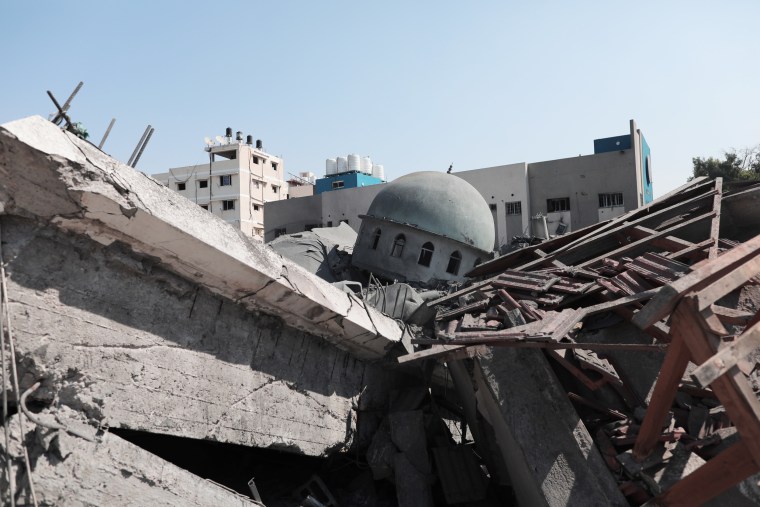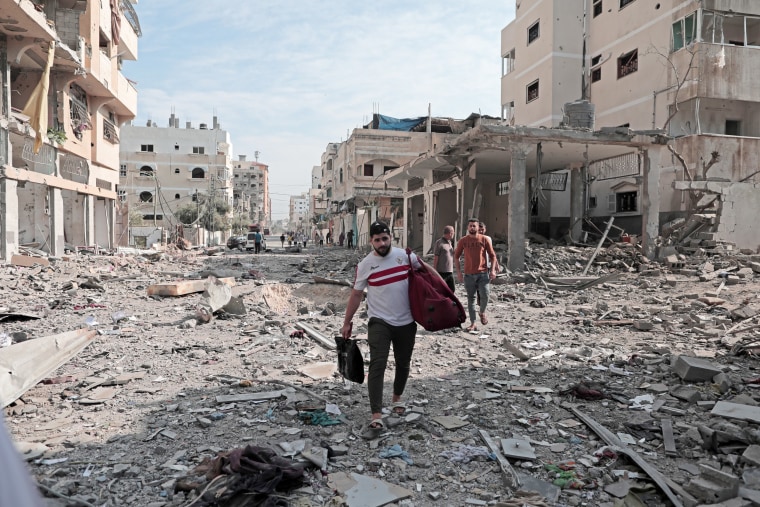Rescuing the hostages held by Hamas militants in the Gaza Strip poses unprecedented and painful choices for Israel, which may have to place a higher priority on a military victory against its adversaries than saving all the hostages, former senior U.S. officials and military officers say.
Israel has a history of daring raids to rescue its citizens or kill its enemies, but the circumstances now are beyond anything the country has faced before. Israel estimates that 150 people are being held prisoner. Any rescue attempt in Gaza would most likely be paired with a major military push to smash Hamas, an operation that could jeopardize the lives of the hostages.
Hamas has threatened to kill a hostage every time Israel bombs civilian targets in Gaza without warning.
Follow live updates from NBC News here.
“This is not going to be a John Wayne ending,” said a former federal law enforcement official who worked closely with Israel.
The first task for Israel is gathering reliable information about the location of the hostages, a daunting prospect given that Hamas controls the densely populated Gaza Strip. Hamas can move hostages and its well-trained fighters through a maze of tunnels, high-rises, rubble and bunkers.
“The biggest challenge is intelligence — knowing where hostages are located and the conditions under which they are being held,” said retired Army Gen. Joseph Votel, who led U.S. Central Command and Special Operations Command.
An American team of experts is on the ground working with Israel to share intelligence and help with the hostage crisis, according to U.S. officials.
“I have directed my team to work with their Israeli counterparts on every aspect of the hostage crisis, including sharing intelligence and deploying experts from across the United States government to consult with and advise Israeli counterparts on hostage recovery efforts,” President Joe Biden said Tuesday.
If precise information about any hostage emerges, Israel — and the U.S. if needed — would have to act with lightning speed before Palestinian militants move their captives, former officials said.

“We need to be on the ground, in position,” said a former U.S. national security official familiar with hostage situations. Any opportunity to stage a rescue will be fleeting, the former official said.
In such complex conditions, military operations to retrieve hostages will carry an unusually high risk both for the captives and for the Israeli commandos taking part, who will be hard-pressed to secure reinforcements if anything goes wrong in an enclave where Hamas fighters are on familiar ground, former officials said. Booby traps and the use of civilians and hostages as human shields are assumed.
“It’s going to be brutal,” said the former national security official.
Israel and Western intelligence services also will have to prepare for the possibility that Hamas will try to smuggle some of the hostages out of Gaza into Egypt and then to other countries, possibly even Iran, which is the group’s primary patron, the ex-official said. Dating to the seizure of the U.S. Embassy in Tehran in 1979, Iran has a long track record of using foreign nationals as leverage over adversaries.
Swapping prisoners for hostages?
Israel’s special forces are considered some of the best in the world and are capable of pulling off high-risk operations.
The country’s elite Sayeret Matkal troops, similar to the U.S. military’s Delta Force and Britain’s SAS, earned a near-mythical status after a nighttime raid at Uganda’s Entebbe airport in 1976, when Israeli commandos rescued more than 100 hostages from a hijacked plane and killed all the hijackers. The Israeli officer who led the raid, Yonatan Netanyahu, the older brother of Israeli Prime Minister Benjamin Netanyahu, died in the operation.
Entebbe was nearly 50 years ago, and confronting Hamas will not be like surprising a small contingent of terrorists and Ugandan troops. But despite the difficult circumstances in Gaza, hostage rescue efforts are still possible to carry out, Votel said.
“I do think it is realistic that hostage recovery operations could be conducted,” said Votel, now a senior fellow at the Middle East Institute think tank. “The Israelis possess the capabilities and the will that, when combined with good intelligence and acceptable risk assessment, could support a successful recovery.”
With searing images circulating online of grandmothers, mothers, teenagers and children being shoved into cars and onto motorcycles at gunpoint by Hamas militants, Netanyahu now has to weigh whether his government will agree to a possible exchange of some imprisoned Palestinians for Israeli captives.
Hamas is demanding the release of 5,200 prisoners it says are held behind bars in Israel in exchange for the hostages.
Before Israel launches what is expedited to be a massive military operation aimed at dismantling Hamas in Gaza, there could still be time for back-channel negotiations brokered by Qatar, Egypt or other countries to secure the releases of at least some of the hostages, experts said.
“I suspect they will try to do the best they can, use the planning time for the military campaign to get help in trying to try to trade some hostages,” said Seth Jones, who served as an adviser to U.S. special operations forces and is now at the Center for Strategic and International Studies think tank.
Previous exchanges have been lopsided in Hamas’ favor. In 2011, Israel released 1,027 prisoners to Hamas in exchange for one Israeli soldier, Gilad Shalit, who had been held for more than five years.
The former national security official said Hamas’ hostage-taking has spread terror but will not succeed in derailing or delaying an expected Israeli military offensive in Gaza. “They’re not going to forestall the invasion,” the former official said.
Jones at CSIS agreed.
“I think when their military planners and commanders believe that the time is now for the operation, I think they’ll go regardless of the hostage situation.”


